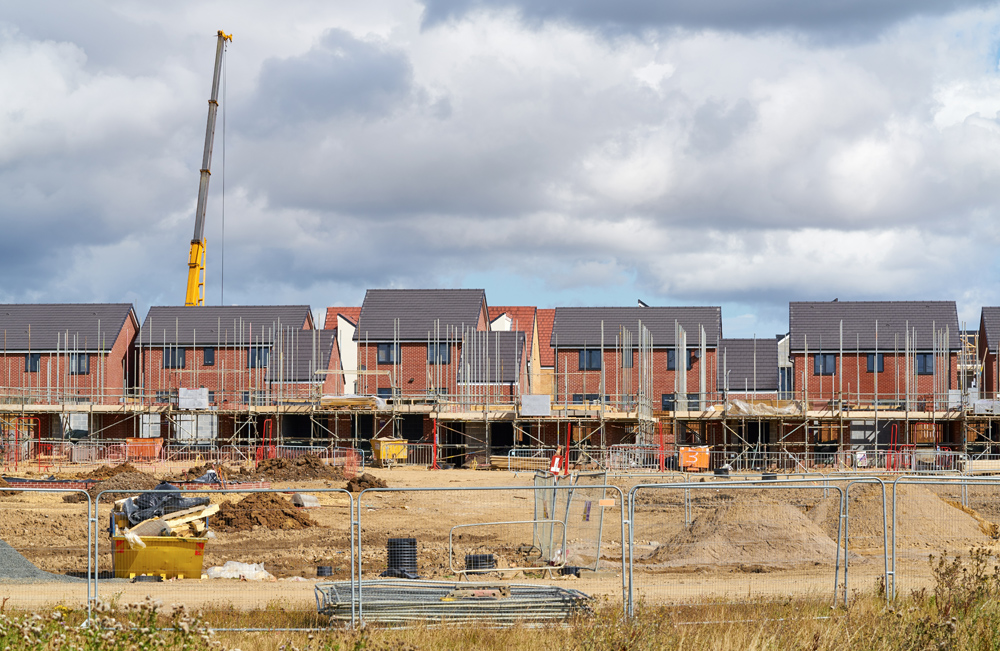Last week Chancellor Rachel Reeves announced £39bn in the Spending Review for affordable housing — a much needed financial boost which has been described as a ‘historic and ground-breaking settlement’ and a ‘once-in-a-generation opportunity to make a significant dent in the social housing challenge’ — £13bn for the Warm Homes Plan and reinforced government’s commitment to devolution. However with only a modest increase in council funding, local authorities face a difficult outlook when it comes to budgets and financial stability. Here we share opinion on the Spending Review from across the sector.
Housebuilding boost ‘hugely welcome’ but funding reform now ‘make or break’ for borough budgets
The £39bn boost for affordable housing announced at the Spending Review is a “potential gamechanger” for efforts to tackle the housing crisis in the capital, according to London Councils, with the cross-party group arguing it is “vital” London receives its fair share of the national pot.
Boroughs have also welcomed the Spending Review bringing additional investment for children’s social care and temporary accommodation, saying this will help local authorities invest in prevention and reduce the cost of delivering services in the long-run.
However, London Councils warns the modest overall increase to council funding means boroughs’ budgets still face an “extremely difficult” outlook in the immediate term and “serious risks” to financial stability, with plans to reform council funding now “make or break” for town hall finances in London.
With the Government consulting on changes to the way in which council funding is distributed, London Councils stressed the importance of ensuring that the money provided to boroughs reflects the high levels of need and significant deprivation in the capital, as well as the rising cost of delivering local services. Key asks include using deprivation measures that account for housing costs, introducing a new formula for homelessness pressures, and accurately assessing demand for children’s services.
Boroughs are grappling with a £500m budget shortfall this year, following more than a decade of structural underfunding, skyrocketing demand for services and rising costs. Almost a quarter of councils in the capital (seven) now rely on emergency borrowing measures through the government’s Exceptional Financial Support programme and more boroughs are likely face the risk of effective bankruptcy if funding reforms fail to deliver sufficient resources.
Cllr Claire Holland, Chair of London Councils, said: “Increased investment in affordable housing is hugely welcome and critical for tackling the capital’s housing crisis. This is a potential gamechanger in our efforts to accelerate housebuilding and it’s vital that London gets its fair share of this funding.
“However, the outlook for boroughs is still extremely difficult and there remain serious risks to our financial stability. More than a decade of structural underfunding, fast-rising demand for services and spiralling costs have pushed council budgets in London to the brink. The upcoming reforms to local government funding are now ‘make or break’ for London boroughs. The resources we receive must match the high levels of need, deprivation and cost of delivering services in the capital.”
“With housing and homelessness the biggest risk to borough finances, increased investment in housebuilding has been a key ask of London Councils in the run up to the Spending Review. London’s allocation of the £39bn pot is yet to be confirmed and boroughs will lobby for the capital to receive its fair share of the Affordable Homes Programme funding, in partnership with the Mayor.
“The Government’s commitment to introducing a 10-year social rent settlement at CPI+1% and consulting on rent convergence has also been welcomed. London Councils has pushed for these policies and recently warned of boroughs reaching a “crunch point” in their social housing finances.
“Confirmation that London will receive an integrated settlement from 2026-27 is a positive step forward for the capital, as this will enable greater flexibility in spending on regional priorities. Boroughs will look to work with the Mayor of London and national government to develop suitable joint-decision making arrangements for relevant funding streams within the integrated settlement, ensuring it can deliver the best possible outcomes for Londoners and maximise value for money.
“However, the lack of any confirmed investment for major transport infrastructure projects in the capital is likely to represent a significant barrier to economic growth and housing delivery. Alongside the Mayor, boroughs will continue to make the case to government to support infrastructure investment in London, through both capital spending and innovative funding mechanisms, such as Land Value Capture.”

Welcome financial boost puts social housing at the heart of growth
Ian McDermott, Chief Executive of Peabody and Chair of G15 commented: “We strongly welcome the Government’s £39bn boost for new social and affordable homes. Equal access to the Building Safety Fund is excellent news and will make a real difference in London. And the pledge on long-term certainty and rent fairness could provide the foundations for a decade of social and economic renewal through housing.
“This is an exceptionally positive statement of intent from the Government which puts social housing at the heart of the growth mission. It’s clear that ministers understand the issues and in London the challenge remains considerable, but this settlement offers a real opportunity to turn the tide. These are potentially transformative announcements, and we stand ready to work with ministers, officials, the Mayor of London’s team, London Councils and partners to deliver in the capital and beyond.”
Historic and ground-breaking funding settlement
Paul Dolan, Chief Executive of Riverside, said: “This is a historic and ground-breaking funding settlement for social landlords, one that was desperately needed and will give Riverside and the wider sector greater certainty over funding throughout the next decade.
“We are pleased to see that the Chancellor has agreed a ten-year index-linked rent settlement. Rent certainty is critical for us to be able to invest in our homes and services, now and into the future.
“The Affordable Homes Programme (AHP) marks a major step in boosting the amount of social housing which is crucial if we are to cut the record number of homeless families living in temporary accommodation.
“We hope to see dedicated funding for urban regeneration play a significant part in the Affordable Homes Programme. As an organisation, we have seen first-hand the difference regeneration makes in improving the quality of homes, neighbourhoods and the health and economic prospects of residents. With one in every six children living in an overcrowded home, dedicated regeneration funding can transform communities up and down the country.”
Key to the delivery of more social housing
Andy Hulme, Group Chief Executive of The Hyde Group, commented: “This funding settlement is very much welcomed and will play a key part in enabling social housing charities to deliver more and better homes.
“We’ve consistently called for long-term funding for new home building and certainty in rent policy to attract investment into the sector. It’s welcome that the Government has engaged with the sector on these points and acted in the Spending Review.
“We look forward to engaging further with the Government through the consultation on rent convergence, which is a critical part of making social housing financially sustainable and is key to delivering new homes, and improving existing homes.”
Housing measures welcome after years of uncertainty and underfunding
Phil Andrew, Chief Executive at Orbit, said: “After years of uncertainty and underfunding, we welcome the housing measures announced by the Chancellor in the Spending Review. We have consistently campaigned for a long-term funding settlement. One which provides us with the financial certainty required to make strategic investments that balance our need to upgrade the homes of our existing customers, whilst building new high quality affordable homes for our communities.
“I am absolutely delighted that the Government has heard our calls and confirmed a 10-year rent settlement, coupled with an additional £39bn for the new Affordable Homes Programme. Together, these will help us to support the Government in realising its ambitions to build £1.5m homes and plan our strategic investments more effectively, to be able to improve our current homes and ensure they are future-fit for our customers.
“Whilst the measures are significant and much-welcomed steps, we must not lose momentum and continue to recognise that the UK’s housing crisis cannot be tackled overnight. We look forward to hearing more about the new Affordable Homes Programme will work, particularly how it can support in regenerating the UK’s ageing housing stock to ensure it is fit for modern living standards.”

Once-in-a-generation opportunity says EDAROTH
Mark Powell, Managing Director for EDAROTH, commented: “The £39bn to fund the Affordable Housing Programme offers a once-in-a-generation opportunity to make a significant dent in the social housing challenge: this is a welcome reinforcement of the Government’s commitment to social and affordable housing that could unlock innovation and rapidly increase the build rate of new homes.
“These plans follow recent proposals to simplify and speed up delivery for SME developers, including the use of innovations such as the small site aggregator tool, and we are optimistic that there will now be real momentum behind this commitment.
“The 10-year rent settlement guarantee provides real confidence for potential investors by offering long-term, government-backed opportunities. This will unlock the funding necessary to deliver the social and affordable homes that are needed to develop thriving communities across the country. Alongside this, the £10bn of financial investments will help to enable the private sector to deliver the new homes needed if we are to reach the 1.5 million target within this parliament.
“We now look forward to further guidance from MHCLG on the specifics of how the AHP funding will be distributed.”
Future delivery must meet the needs of our ageing population
Sarah Jones, Chief Executive at Anchor commented:”We are pleased to see the Government’s commitment to affordable housing and look forward to a bold, deliverable national housing and planning strategy which should have a clear and urgent focus on homes for older people.
“Increasing the supply of homes for older people is essential to meet growing demand and to enable more people to live well and independently for longer. We look forward to working with the Government to ensure future delivery meets the needs of our ageing population as part of the forthcoming housing strategy.
“Alongside the 10-year investment in affordable housing, the CPI+1% rent settlement and the consultation on rent convergence are welcome milestones and ones Anchor have been calling for. They provide greater certainty and confidence needed to boost investment in both new and existing homes, enabling providers to plan effectively and deliver high-quality, age-appropriate housing that our communities urgently need.
“We urge Government to allocate at least 10% of Homes England’s capital funding specifically to homes for older people, alongside a mirrored commitment within local housing strategies. This would help unlock much-needed supply, enabling older people to live well and independently in homes that meet their changing needs.
“This targeted investment would support the 35% of older people who, according to our research, would consider downsizing, helping them access more suitable housing while freeing up capacity for younger generations to move up the housing ladder.
“By prioritising age-appropriate housing, we aim to support healthier, more independent living in later life, reduce pressure on the NHS and social care, and ease wider strain on the housing market by freeing up family homes for the next generation.”
Gives housing associations certainty for the future
Paul Richmond, CEO of Thrive Homes, said: “At Thrive Homes, we have long advocated for a long-term rent settlement, and so we are delighted by these announcements. Alongside the £39bn earmarked for affordable housing, these two commitments give housing associations like us certainty for the future, allowing us to borrow and make long-term investments to create the next generation of high-quality, affordable homes for people who need them most.”
Missions driven Spending Review
Jonathan Carr-West, Chief Executive, Local Government Information Unit (LGIU), commented: “This was a ‘missions’ driven Spending Review — with eye-catching sums for projects aimed at delivering growth, clean energy and a 3% rise in spending on the NHS. Angela Rayner has clearly persuaded the Chancellor to put the affordable homes agenda front and centre of today’s statement, with that promise of £39bn.
“It was a Spending Review full of hard choices for the Government in the face of tough financial circumstances, a position all of us in local government are used to. These decisions will have major implications for local government and local communities across the country for years to come.
“The Chancellor’s Spending Review also reinforced this government’s commitment to devolving power to regions across England, commits the government to major investments in housing and infrastructure, and pledges new funds to support regional and local growth across England and the devolved nations. This should be welcomed.
“While it was never going to answer every unanswered question that local government has, it does outline when we might expect at least a few answers. Reorganisation, changes to the allocation of funding settlements, devolution, SEND reform, and, eventually, social care funding reform, all of these were promised in the Spending Review. They are all crucial to putting local government back on a sustainable footing — but they have all been promised before.
“Optimal delivery of every single one of the Government’s missions needs robust and financially stable local government. And once again, the Government’s plans for how that will be achieved are left dangling just out of reach.”
Glenigan analysis on what the Spending Review means for the UK construction sector
On energy and renewables
Allan Wilen, Glenigan’s Economic Director said: “Reinforcing and futureproofing our energy infrastructure was at the heart of the Spending Review, especially a doubling down on the Government’s commitment to Great British Energy. This implies there will be plenty of opportunities for UK construction businesses. The announcement of £30bn of funding for nuclear generation is a welcome longer-term commitment to improve the UK’s energy security, particularly the £14bn earmarked for Sizewell C and the launch of a modular reactor programme. As the Chancellor rightly says it will create plenty of employment opportunities across the UK and usher in a new age of nuclear power.”
On transport infrastructure
Allan said: “The additional transport investment announced is great news for the industry and will help lift UK productivity and economic growth over the longer term. As anticipated, geographically the funding has been directed towards the Midlands and the North of England. Wales was also a big beneficiary, giving its creaking rail infrastructure a much-needed upgrade. This will help drive regional growth in these parts of the country. In contrast the previously announced commitment to the Lower Thames Crossing will provide both a boost to economic growth in London and the South East and more generally improve access to European markets.”
On housebuilding
Allan said: “Funding for social housing has been a longtime coming. However, whilst the Spending Review promises plenty of support over the next decade, it’s essential that early progress is made to provide the capital funding required for housing associations to bring forward more social housing projects and the resources to take on social and affordable homes provided by private housebuilders through the section 106 obligations.
“However, it appears that there is still a lack of political commitment to address the poor energy efficiency of the UK’s housing stock, most of which is privately owned, in order to cost effectively deliver net zero and protect households from future energy price rises. Current funding programmes remain focussed on improving the energy efficiency of existing social housing and tackling fuel poverty. Whilst direct public subsidies to homeowners to upgrade the energy performance of their homes is unlikely to find political favour, the tax system could encourage homeowners to take action. For example, stamp duty rates could vary according to a homes EPC rating and/or stamp duty rebates could be available to purchasers undertaking energy efficiency improvements to their new home.”
On communities and amenities
Allan said: “Local amenities were also mentioned within the Spending Review, with a commitment to support 350 communities upgrading their public services and spaces from parks and landmarks to libraries and youth centres. This will provide a good, steady stream of work for local contractors and subcontractors, potentially supporting SME builders who have had a tough ride over the past few years.”
On education
Allan said: “Education buildings, often overlooked in previous Reviews, also featured. The Government has earmarked budget to address crumbling classrooms and put an end to temporary learning spaces, a reference to the RAAC eradication programme, which is already in full-swing. Not only that it’s doubled down on its commitment to ‘rebuild’ 500 run-down schools up and down the country. However, many might feel that the allocation is not nearly large enough to address the extent of dilapidation which exists across many state schools up and down the country.”

A procurement perspective on Labour’s Spending Review
Simon Toplass, Chief Executive Officer at Pagabo Group, commented: “The headline announcement of the £39bn, 10-year Affordable Homes Programme is a seismic shift in the way affordable housing will be funded and delivered over the coming decade, and represents the biggest cash injection into social and affordable housing in half a century. Programmes such as this are a catalyst for greater stability, innovation and capacity in the housing sector — all of which are critical to meeting the UK’s chronic need for affordable homes.
“Setting a decade-long funding horizon also provides much-needed certainty for housing associations, local authorities, and developers — stability which in turn empowers the sector to invest in skills development, modern methods of construction and long-term partnerships
“By redesignating Homes England as a public finance institution, new financing models will also be brought to the table. This evolution will require the housing and construction sector to adapt quickly to these new funding models and delivery mechanisms, especially when it comes to making sure that procurement can integrate seamlessly with funding and delivery.

“Our recent experience has shown that public-private partnerships involving local authorities, private developers and local consultants offer a model that gets homes and wider development on site much more effectively. It’s a model that does not currently receive the appreciation it deserves, but we are seeing increased engagement with available procurement routes, which help facilitate growth.
“As ever with such large-scale housing programmes, it will be imperative that positive social outcomes remain at the forefront of the minds of those charged with delivering it — and embedding this into procurement processes and contracts can be effective in assuring that delivery. For the revamped Affordable Homes Programme to be a success, it needs to ensure that the promise of increased, sustained investment translates into more affordable homes being built, rather than just spreading the existing commitments more thinly.
“Elsewhere, the other clear winners from Wednesday’s Review were the health and defence sectors. While the NHS is set to receive an additional £29bn for service delivery, working out at an increase of 2.8% of GDP per year over the next three years, financial support for the Ministry of Defence is to grow to 2.6%.
“Overall, with total departmental budgets set to grow by 2.3% a year in real terms, it’s important that money is used effectively and efficiently. Not only to reach desired outcomes sooner and derive value from procurement, but to help justify £190bn more than the Conservatives had planned.
“Looking at the spending forecast, it’s expected that growth in real terms will reduce in the final three years of this parliament. While government headlines paint a positive picture, real judgement can only be made if and when the initial momentum expected is maintained. With £113bn allocated for capital spend, the hope is that a strong pipeline of projects across green and nuclear energy, housing and infrastructure come to fruition. From central government to local authorities, the prospect of competitive tendering should excite both our industry and the communities that will benefit.
“With any form of public sector, compliance is key — as scrutiny will remain. Now the Procurement Act is also in place and additional obligations must be met, organisations across the public sector will need to balance their ambitions to procure both quickly and compliantly. I expect this will be particularly true in relation to retrofit and decarbonisation projects, where targets are in place and the clock is ticking. The benefits of energy efficiency work can come about quickly for those living in unsatisfactory homes, which I am sure the government considered when deciding to expand its Warm Homes Plan.
“And finally, touching on the £15bn boost to support regional transport connections, this is welcome news for the towns and cities of the north. The time to talk about connectivity is over, and it’s time to deliver. As a Hull-based business, we would like to see the vision for proper coast-to-coast connectivity become reality, though we will settle for our surrounding towns and cities first. Not only will this benefit us from a recruitment perspective, but more importantly it will improve many people’s everyday lives and create new opportunities. We’ve seen more rapid evolution of transport infrastructure in the south, so it’s time for the same commitment to the north.”

Habitat for Humanity GB welcomes the pledge of £39bn to the Affordable Homes Programme
Dr Henrietta Blackmore, Director of Habitat for Humanity GB, said: “The Chancellor’s £39bn commitment to the Affordable Homes Programme is a welcome recognition that our housing crisis will only be solved with significant public investment. Increasing our social housing stock is the key –— this should be prioritised above delivering raw housing numbers.
“The 10-year rent settlement will also provide much-needed certainty for social landlords and should encourage further investment. While this is welcome for the sector overall, for individual families in social housing already struggling it will create additional pressure, and it is crucial that welfare support reflects this.”
Starting point for long-lasting change
Emma Joy Smith, Social Housing Partner at law firm, Freeths said: “The social housing sector has been overlooked for too long, but an injection of £39bn into the Affordable Homes Programme over the next 10 years could be the starting point for real, long-lasting change. With waiting lists recently revealed to be over 100 years in some areas of the UK, there is still a long road ahead and a lot of work to be done. The Government needs to ensure that this investment doesn’t also come with more cumbersome bureaucracy so that housing associations can hit the ground running.
“The announcements should be celebrated and give certainty and direction to a sector that has been left to stagnate for too long. The need to build affordable homes goes beyond just meeting a target, it changes lives. The ability to put down roots, become part of a community and live in safe, high quality affordable housing helps individuals, cities and the country flourish. The UK will reap the benefits of the announcement for years to come.
Historic uplift in capital support
Ed Matthew, UK Director at climate change think tank E3G, commented: “This is a historic uplift in capital support for building a clean economy. It will turbo-boost investment in clean energy in every part of the country, reducing climate change emissions and bolstering energy security. The missing piece of the puzzle is action to bring down electricity prices for industry. The forthcoming industrial strategy must tackle this head on to unlock a new era of clean industrial growth.”
£13.2bn Warm Homes manifesto commitment
James Dyson, Senior Researcher at E3G said: “This money will permanently bring down energy bills for millions of people. The insulation industry has been decimated in recent years and this will give it a chance to re-build. This announcement is proof that this government is serious about tackling fuel poverty, boosting energy security and cutting our reliance on Russian gas.”
Net Zero Investment Plan
Heather McKay, Programme Lead, Finance and Resilience at E3G commented: “Despite welcome announcements in the Spending Review, the Government and the private sector must work in lockstep to unlock investment at the scale. The Chancellor must commit in her upcoming Financial Services Growth Strategy to deliver a UK wide Net Zero Investment Plan. Without a serious plan to mobilise capital, her promise to deliver jobs, growth and energy security will be empty.”
Structural Timber Association (STA) pleased to see housing a key focus within the Spending Review
Andrew Orriss, Chief Executive of the STA, said: “Housing is the biggest challenge that the UK currently faces, and the Labour Government underpinned it is one of their main objectives throughout their election campaign and budgets. It was positive to see that the Government has reaffirmed this commitment with a pledge of £39bn for affordable housing over the next 10 years.
“With the Government reconfirming their commitment to the revised Timber in Construction Policy Roadmap in February 2025, there is certainly no doubt that increasing the use of structural timber and offsite manufacturing is a key aspect of ensuring the rapid and high-quality delivery of these vitally needed homes.
“The Structural Timber Association remains wholly committed to working collaboratively with government, industry partners, and stakeholders to drive a transformative approach.”
Significant boost for Affordable Homes Programme
Francis Truss, Partner at Carter Jonas commented: “The further boost to affordable housing grant funding should help the sector to increase housing delivery, particularly at a time when many Registered Providers are prioritising improvements to the quality of their existing stock and therefore their appetite for taking on additional stock via Section 106 agreements is proving limited.
“To sound a note of caution however, it will be important to understand whether this funding is in addition to the funding announced for the Affordable Housing Programme in the Spring Statement. The Chancellor stated that £39bn worth of grants will be spent by local authorities, private developers and housing associations over 10 years. This sounds positive but how significant an increase is it on the previous programme?
“The £3.9bn per year should be considered in the context of £2.1bn per year in affordable housing grants which were made available via Homes England in 2023/2024. So as ‘new funding’ this represents £1.8bn for each remaining year of this parliament.
“Furthermore, it is clear that the Government’s priority is affordable housing for rent and there is a noticeable absence of support for first time buyers in the open market. Help to Buy was an important part of the growth in housing delivery pre-Covid (2015-2020) and the housing industry has been very keen to see its return.”
Funding for infrastructure
Francis Truss added: “We are yet to hear whether there will be specific long-term affordable housing grant support for the Government’s aspiration for 12 new towns (which will inevitably have a significant affordable housing requirement). Realistically, none of the new towns will come forward this Parliament but viability assessments, which will be taking place already, will not be able to assume the equivalent level of affordable housing grant funding.
“However, the (separate) financial transaction budget within the Comprehensive Spending Review could provide a mechanism for the Government to follow through on a (forecasted) major theme of the New Towns Taskforce (due in July 2025) which is how public sector funding is essential in order to ‘crowd in’ private investment, to aide the delivery of the next generation of New Towns. It goes without saying that expanding and growing the quantum of development on such sites will rely on new sources of finance. A long-term commitment from the Government, giving investors the necessary security, can help facilitate the delivery of such schemes.
“There is nothing to indicate if the ‘general’ level of infrastructure/land remediation investment (noted in the Comprehensive Spending Review) will differ from trend levels but if the level was higher, this could provide another lever to assist delivery relative to the 1.5 million homes target to be met outside of the long-term delivery of New Towns.”
Budget for the Warm Homes Plan has been confirmed at £13bn
Tamsin Lishman, CEO of Kensa, commented: “The confirmation of a significant £13bn budget for the Warm Homes Plan is a hugely positive step towards improving the efficiency of our homes, cutting energy bills and ending our reliance on imported fossil fuels. With home grown renewable energy increasingly the cheapest option available, it no longer makes sense to warm our homes by burning gas extracted thousands of miles away, transported here in tankers, heating the planet in the process.
“The commitment to adequately fund the Warm Homes Plan is a firm acknowledgement of the challenges we face in upgrading our homes, but also of the government’s determination to tackle these head on.
“For too long heat policy suffered from uncertainty and indecision, delaying action and dampening investor confidence. But today’s Warm Homes commitment, and last week’s confirmation that the Future Homes Standard will soon end boiler installations in new homes, demonstrates the leadership needed to kickstart a clean heat revolution.
“Kensa has long standing plans for investment, expanding our heat pump production capacity, onshoring and enhancing our supply chains, and growing our workforce. There remain important steps to unlock that investment, not least legislating for the Future Homes Standard, but I am buoyed by the progress we have seen in the last week, and confident we will soon see that investment start to flow into the sector.”
New funding and rent deal turbocharges investor appetite for affordable homes
Jack Burnham, Head of Affordable Housing at Octopus Capital said: “We welcome the Government’s £39bn commitment to affordable housing over the next decade, alongside the introduction of a 10-year rent settlement set at CPI +1%. This is a positive and pragmatic move that supports the scale-up of affordable housing delivery across the UK — and aligns closely with the priorities of long-term institutional investors.
“The announcement effectively doubles the level of annual grant funding, from around £1.5bn to almost £4bn per year. As a fund and registered provider that already receives Homes England grant, we see first-hand the impact this support has in enabling the delivery of genuinely affordable homes. The increased allocation will allow us — and others — to bring forward more projects, in more places, at rents that are sustainable for residents and communities.
“The 10-year CPI +1% social housing rent settlement from 2026 provides welcome long-term policy stability. For investors seeking secure, inflation-linked income over multi-decade horizons, this gives a robust and transparent framework that enhances the resilience and predictability of returns. It strengthens the case for affordable housing as a core component of modern social infrastructure portfolios.
“This policy direction underlines the government’s recognition that affordable housing is critical national infrastructure — essential not only to addressing the housing crisis, but to delivering broader social and economic value.
“At Octopus, we remain committed to investing for the long term through our Affordable Housing Fund and our for-profit registered provider, NewArch Homes. This programme gives us the tools and certainty to go further and faster, in partnership with local authorities, housing associations and developers.”
Additional support for local authorities welcome, but urgent action needed to support councils in tackling homelessness
Victoria Searle, Principal Associate in the Government team at UK and Ireland law firm Browne Jacobson, commented: “The additional support for local authorities aimed at addressing the causes of homelessness is welcomed.
“The £950m of capital investment between 2026-27 and 2029-30 will allow local authorities to reduce their use of costly nightly-let accommodation, and to invest in good-quality temporary accommodation in order to provide it directly to those who need it. This, coupled with the £39bn investment in a new Affordable Housing Programme, will support local authorities to move more families from unsuitable bed and breakfast, and hostel accommodation into more settled longer-term housing
“The £100m for homeless prevention should also enable greater early intervention, reducing demand for homelessness services and improving outcomes for families. However, with councils facing an average £76m funding gap in their homelessness budgets, according to analysis by the Local Government Association, the Government must take urgent action to support local authorities with meeting their homelessness duties this year and next.
“One quick win would be lifting the cap on housing benefit subsidies for temporary accommodation. This would immediately ease the current funding pressures, while local authorities invest their new grant monies to acquire new good quality temporary accommodation, putting their finances on a more sustainable footing.
“In the longer term, allowing local authority pension funds to acquire temporary accommodation and then lease it back to the authority on preferential terms could be a game-changer.”
£39bn for affordable housing a ‘watershed’ moment
Gabor Taller, Partner and Co-head of social housing at UK and Ireland law firm Browne Jacobson, added: “A new £39bn 10-year Affordable Homes Programme is being described as ‘transformative’ and a ‘watershed moment’ by the housing sector, providing a potentially once-in-a-generation opportunity to boost the provision of social housing in England.
“Coupled with the 10-year rent settlement, a pledge to consult on how social rent convergence can be implemented and giving housing associations equal access to building safety funding, this package of measures provides housing associations – and their partners – with the certainty they have been severely lacking in recent years.
“Details are still to come on aspects such as the types of homes to be prioritised, the ratio between social rented and shared ownership, the role of modern methods of construction and the involvement of SME developers – while there’s also plenty of work to do in practically closing construction skills gaps despite separate funding pledges.
“The Government’s manifesto said it would deliver the biggest increase in supply of social and affordable homes in a generation – and these announcements signal a transition from policy to practice.”

Energy security is national security
Russell Dean, Deputy Divisional Manager at Mitsubishi Electric said: “The Chancellor of the Exchequer is right to assert that energy security is national security. Crucial to this is lowering the price of electricity and accelerating heat pump adoption, which will reduce our reliance on volatile oil and gas markets and support the transition to net zero.
“Greater government certainty on policies looking to decarbonise heating, such through the Future Homes Standard and the rebalancing of the price of electricity, will make this a reality and give the industry confidence to invest. The Government’s continued support for the Warm Homes Plan is welcomed, and we urge them to maintain support for families to decarbonise their homes, such as funding through the Boiler Upgrade Scheme. This will be essential in helping government meet its heat pump installation target and net zero by 2050.
“Long-term consistency in climate policy is essential to attracting investment, growing supply chains, and delivering the green jobs and infrastructure promised for Britain’s future.”
The long-term reliable subsidy that the sector has been calling for
Sarah Rowe, Partner and Head of Social Housing at leading law firm Freeths, commented: “What has been announced is a 50% uplift on the size of the previous programme and for the first time in living memory will provide 10 years of certainty. This alongside the rent settlement at CPI+1% for the same period is the long-term reliable subsidy that the sector has been calling for, for a long time.
“The devil as always will be in the detail in terms of grant rates, whether there will be a focus on social rent, where the shortage is acute, or any monies available for S.106 units where the market is in dire straits which is ultimately having a knock-on effect to the overall delivery of housing.
“The hard work begins now. Securing the partnerships needed to support the delivery afforded by the Affordable Homes Programme will be key to this. Partnerships was a key topic at UKReiiF a couple of weeks ago and I am sure will be on the agenda at Housing 2025 at the end of June.”
Major boost for sector that reflects government’s ambitions
Emma Hardman, Partner and Housing Sector Lead at Anthony Collins said: “This £39bn funding announcement is a major boost for the sector and reflects the Government’s ambitious commitment to build 1.5 million new homes in the current parliament. Demand for affordable homes is rising across the country and the grant funding confirmed by the Chancellor for the new Affordable Homes Programme (AHP), spanning the next 10 years, will kickstart significant housing development of social and affordable rent properties required across England.
“If anything, the grant funding announced is much more than many registered providers and the sector were expecting, and the long-term nature of the funding commitment and amount will bring greater certainty for financial planning. As ever, we must wait for the detail to confirm the scope of the funding and how it will be administered. For example, we don’t yet know if S106 agreements will be included in the scope of the AHP 2026-36, which could stimulate development activity further and with increased costs of building properties, it won’t be sufficient to cover all new builds but will make a substantial difference. It is expected that the funding will be administered through local authorities, but this level of detail will be announced later in the year.
“Following last year’s consultation on plans to maintain the cap on annual social rent increases at CPI +1% for the next five years, few Registered Providers (RPs) were expecting this to be improved upon. However, the Chancellor has now committed to CPI + 1% for the next 10 years, which is an excellent outcome for the sector in the circumstances: it provides greater financial certainty moving forward and allows longer-term business planning, which in-turn should create longer-term stability across the sector. It should go some way to helping Registered Providers to improve the viability of their business models at a time when costs have risen significantly (and will continue to do so) and regulatory pressures are requiring urgent repair and retrofit programmes for their existing stock.
“The decision to consult further on how to implement social rent convergence, which was removed by the Rent Standard 2015, is more good news for the sector. It shows the Government has been listening to the concerns set out in consultation responses. Reinstating rent convergence would be especially helpful to social landlords with long-term tenants who have been paying a rent that is in some cases well below the current ‘Formula Rent’ for some time.
“The removal of rent convergence has impacted the total income of some RPs significantly, exacerbated by the 1% rent decrease applied in 2016-2020, the rent cap in 2023 and costs increasing higher than inflation. Without the ability to bring rents into line with Formula Rent, this has created challenges for some social landlords, which in turn has caused some new development activity to stall. Reinstating the rent convergence would be a win for the sector and further support the provision of much-needed affordable homes and investment in existing stock.
“A second consultation gives opportunity for tenants and others to put forward their views and comments on this proposal. Whilst many landlords and the sector strongly advocated for the re-introduction of rent convergence within their general comments in consultation responses, the idea was not part of the Government’s original rent settlement proposals in 2024 and so not necessarily an issue tenants would have responded on. This further consultation gives them (and landlords again) a clear opportunity to do so now.”
Starting point for real, long-lasting change
Emma Joy Smith, Social Housing Partner at law firm, Shakespeare Martineau, said: “The social housing sector has been overlooked for too long, but an injection of £39bn into the Affordable Homes Programme over the next 10 years could be the starting point for real, long-lasting change. With waiting lists recently revealed to be over 100 years in some areas of the UK, there is still a long road ahead and a lot of work to be done. The government needs to ensure that this investment doesn’t also come with more cumbersome bureaucracy so that housing associations can hit the ground running.
“The announcements should be celebrated and give certainty and direction to a sector that has been left to stagnate for too long. The need to build affordable homes goes beyond just meeting a target, it changes lives. The ability to put down roots, become part of a community and live in safe, high quality affordable housing helps individuals, cities and the country flourish. The UK will reap the benefits of today’s announcement for years to come.”
Biggest cash injection in 50 years into social and affordable homes
Ruby Giblin, a Partner in Winckworth Sherwood’s dedicated Housing Finance practice commented: “The Spending Review gives housebuilders and social housing providers plenty to cheer. The 10-year rent settlement at inflation plus 1% is a bold and welcomed move that will provide certainty for social housing providers and funders. But for it to have real and lasting impact it must survive a possible change of government at the next General Election, and that is not guaranteed.
“The consultation on rent convergence will be welcomed by social housing providers and local authorities. Social housing rents often reflect when a home was built, different rent policies and changes in subsidies, meaning rents can vary enormously for homes of the same size and in similar locations.
“Addressing rent convergence will provide social housing providers significant additional revenues to develop new homes and buy up thousands of new units already built by private developers as part of their affordable housing commitments.
“Together with the £39bn Affordable Homes Programme, the Government has made clear that is serious about new and affordable homes across the UK. However, as with all significant government announcements, the devil will be in the detail. What, for example, will the announcement mean for those with shared ownership tenures.”
Header image: ©johndwilliams/AdobeStock










